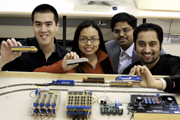|
by Barbara Black
Students in a computer engineering courses have been playing with model
trains lately, thanks to Professor Purnendu Sinha.
COEN 421 is an embedded systems software design course that fosters hands-on
training in a specialized real-time systems lab. Using virtual software,
students have to program the routing of three trains on a designated model
track layout.
Controlling trains gave students a graphic sense of what could go wrong
if their design was inadequate. As they wrote applications that sent impulses
to the layout’s control board, they had to get a train to detect
when another train was approaching on the same track, and move smoothly
onto a siding to let it pass.
Sinha said he started them with the simplest challenge and worked up to
more complex operations. “One of the hardest things,” said one
of the students, “was to visualize each train separately.” They
also had to avoid deadlock, where two trains would simply stop, facing
each other.
“Embedded systems play an important role in our day-to-day life,”
Dr. Sinha explained. “They are found in domestic appliances, automobiles,
telephones, electronic gadgets, banking systems, nuclear power plants,
avionics, and many other places.
“Nowadays, software is an integral part in most of these embedded
systems. Software development for embedded systems requires structured,
disciplined and transparent approach to efficiently create and maintain
high-quality software and ensure the reliability of these complex software
systems.”
“This design project is to develop a software system using object-oriented
methodology that can manage movement of three miniature trains moving
in arbitrary directions on a specified track-layout,” Sinha explained.
“The objective is to avoid derailment and collision at any moment.
“The experiments are designed in an incremental manner so that students
first develop all necessary software modules for controlling speed, track-switching
mechanism, and so on, and ultimately, integrate them all.”
The students were working in the Electrical and Computer Engineering Department’s
Real-Time System Laboratory (RTSL) on the eighth floor of the Hall Building.
They also had a lab manual and a continually updated FAQ page on the lab
Web site to help them come up with a good design and resolve any difficulties
that arose over the design process.
|




